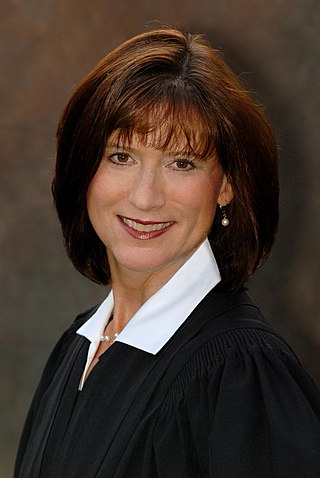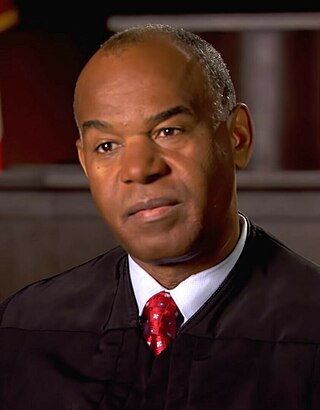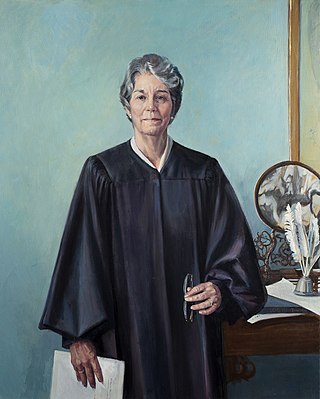Related Research Articles

In United States constitutional law, the political questiondoctrine holds that a constitutional dispute that requires knowledge of a non-legal character or the use of techniques not suitable for a court or explicitly assigned by the Constitution to the U.S. Congress, or the President of the United States, lies within the political, rather than the legal, realm to solve, and judges customarily refuse to address such matters. The idea of a political question is closely linked to the concept of justiciability, as it comes down to a question of whether or not the court system is an appropriate forum in which to hear the case. This is because the court system only has the authority to hear and decide a legal question, not a political one. Legal questions are deemed to be justiciable, while political questions are nonjusticiable. One scholar explained:
The political question doctrine holds that some questions, in their nature, are fundamentally political, and not legal, and if a question is fundamentally political ... then the court will refuse to hear that case. It will claim that it doesn't have jurisdiction. And it will leave that question to some other aspect of the political process to settle out.
Guido Calabresi is an Italian-born American jurist who serves as a senior circuit judge of the United States Court of Appeals for the Second Circuit. He is a former Dean of Yale Law School, where he has been a professor since 1959. Calabresi is considered, along with Ronald Coase and Richard Posner, a founder of the field of law and economics.

Michael William McConnell is an American jurist who served as a United States circuit judge of the United States Court of Appeals for the Tenth Circuit from 2002 to 2009. Since 2009, McConnell has been a professor and Director of the Stanford Constitutional Law Center at Stanford Law School. He is also a senior fellow at Stanford University's Hoover Institution, and Senior Of Counsel to the Litigation Practice Group at Wilson Sonsini Goodrich & Rosati. In May 2020, Facebook appointed him to its content oversight board. In 2020, McConnell published The President Who Would Not Be King: Executive Power under the Constitution under Princeton University Press.

Diane Schwerm Sykes is an American jurist and lawyer who serves as the chief judge of the U.S. Court of Appeals for the Seventh Circuit. She served as a justice of the Wisconsin Supreme Court from 1999 to 2004.

Patrick Errol Higginbotham is an American judge and lawyer who serves as a senior United States circuit judge of the United States Court of Appeals for the Fifth Circuit.
Textualism is a formalist theory in which the interpretation of the law is based exclusively on the ordinary meaning of the legal text, where no consideration is given to non-textual sources, such as intention of the law when passed, the problem it was intended to remedy, or significant questions regarding the justice or rectitude of the law.

Burt Neuborne is the Norman Dorsen Professor of Civil Liberties at New York University School of Law and the founding legal director of the Brennan Center for Justice.

Roger Lee Gregory is an American lawyer who serves as a United States circuit judge of the United States Court of Appeals for the Fourth Circuit.
Hudson v. Michigan, 547 U.S. 586 (2006), is a United States Supreme Court case in which the Court held that a violation of the Fourth Amendment requirement that police officers knock, announce their presence, and wait a reasonable amount of time before entering a private residence does not require suppression of the evidence obtained in the ensuing search.
Rosemary Shankman Pooler was a United States circuit judge of the United States Court of Appeals for the Second Circuit.
Stephen Wizner is the William O. Douglas Clinical Professor of Law at Yale Law School. He also has a Special Appointment as the Sackler Professor of Law at Tel Aviv University.
Cynthia Estlund is the Catherine A. Rein Professor of Law at the New York University School of Law.
Steven Gow Calabresi is an American legal scholar who is the Clayton J. and Henry R. Barber Professor of Law at Northwestern University. He is the co-chairman of the Federalist Society. He is the nephew of Guido Calabresi, a U.S. Appellate judge and former dean of the Yale Law School.

Deborah Havis Koss Chasanow is a senior United States district judge of the United States District Court for the District of Maryland.
Louis Michael Seidman is the Carmack Waterhouse Professor of Constitutional Law at Georgetown University Law Center in Washington, D.C.. He is a constitutional law scholar and major proponent of the critical legal studies movement. Seidman's 2012 work is On Constitutional Disobedience, where Seidman challenges the viability of political policy arguments made in reference to constitutional obligation.

Stephanie Dawn Thacker is a United States circuit judge of the United States Court of Appeals for the Fourth Circuit.

Cornelia Thayer Livingston Pillard, known professionally as Nina Pillard, is an American lawyer and jurist serving since 2013 as a U.S. circuit judge of the United States Court of Appeals for the District of Columbia Circuit. Before becoming a judge, Pillard was a law professor at Georgetown University.

In United States constitutional law, the penumbra includes a group of rights derived, by implication, from other rights explicitly protected in the Bill of Rights. These rights have been identified through a process of "reasoning-by-interpolation", where specific principles are recognized from "general idea[s]" that are explicitly expressed in other constitutional provisions. Although researchers have traced the origin of the term to the nineteenth century, the term first gained significant popular attention in 1965, when Justice William O. Douglas's majority opinion in Griswold v. Connecticut identified a right to privacy in the penumbra of the constitution.
Gary S. Lawson is an American lawyer whose focus is in administrative law, constitutional law, legal history, and jurisprudence. He was a law clerk for Judge Antonin Scalia of the United States Court of Appeals for the District of Columbia from 1985–86 and clerked for Scalia again during his 1986-87 term on the United States Supreme Court. Lawson is currently a professor at the University of Florida Levin College of Law. His immediate prior position was the Philip S. Beck Professor of Law at Boston University School of Law. And he previously taught at the Northwestern University Pritzker School of Law. He is the secretary of the board of directors of the Federalist Society. With Steven G. Calabresi, he has argued that the Mueller Probe was "unlawful."

Daniel Paul Collins is a United States circuit judge of the United States Court of Appeals for the Ninth Circuit.
References
- ↑ See, e.g., Maureen Armoor, Rethinking Judicial Discretion: Sanctions and the Conundrum of the Close Case, 50 S.M.U. L. Rev. 493, 496 (1997); Ward Farnsworth, The Role of Law in Close Cases: Some Evidence from the Federal Courts of Appeals , 86 B.U. L. Rev. 1083, 1095 (2006).
- ↑ See, e.g., The Selection of Interim Justices in California: An Empirical Study, 32 Stan. L. Rev. 433, 437 (1980).
- ↑ Guido Calabresi, The Exclusionary Rule , 26 Harv. J.L. & Pub. Pol'y 111, 112 (2003) (characterizing this process as a "slippery slope").
- ↑ Frank E. Jr. Watkins; Daniel G. Kyle, A Proposal for the Operation of Section 534 with Section 535, 52 Taxes 240, 248 (1974).
- ↑ See, e.g., The Selection of Interim Justices in California: An Empirical Study, 32 Stan. L. Rev. 433, 437 (1980); Maureen Armoor, Rethinking Judicial Discretion: Sanctions and the Conundrum of the Close Case, 50 S.M.U. L. Rev. 493, 496 (1997).
- ↑ Maureen Armoor, Rethinking Judicial Discretion: Sanctions and the Conundrum of the Close Case, 50 S.M.U. L. Rev. 493, 496 (1997).
- ↑ Ward Farnsworth, The Role of Law in Close Cases: Some Evidence from the Federal Courts of Appeals , 86 B.U. L. Rev. 1083, 1088, 1095 (2006).
- ↑ The Selection of Interim Justices in California: An Empirical Study, 32 Stan. L. Rev. 433, 437 (1980); see also Stephen R. Barnett; Daniel L. Rubinfeld, The Assignment of Temporary Justices in the California Supreme Court, 17 Pac. L. J. 1045, 1064–67 (1986) (critiquing the methodology of the Stanford study).
- ↑ John E. Coons, Approaches to Court Imposed Compromise-The Uses of Doubt and Reason , 58 Nw. U. L. Rev. 750, 751 (1963).
- ↑ Guido Calabresi, The Exclusionary Rule , 26 Harv. J.L. & Pub. Pol'y 111, 112 (2003) (noting that Chief Judge John M. Walker, Jr. of the United States Court of Appeals for the Second Circuit described this process as "[t]he hydraulic effect").
- ↑ Guido Calabresi, The Exclusionary Rule , 26 Harv. J.L. & Pub. Pol'y 111, 112 (2003).
- ↑ Ward Farnsworth, The Role of Law in Close Cases: Some Evidence from the Federal Courts of Appeals , 86 B.U. L. Rev. 1083, 1095 (2006).